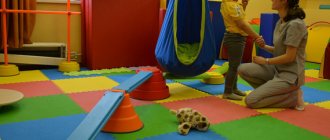In modern society, not only children, but also adults need the services of a speech therapist.
The reason for consulting a child with a speech therapist may be incorrect pronunciation of sounds, difficulties in understanding the child’s speech by others, excessive haste or slowness of speech, problems with voice and diction, impaired written speech, etc. A speech therapist for adults helps correct speech defects that were not corrected in childhood or acquired as a result of strokes or traumatic brain injuries.
You should visit a speech therapist with your child not only if the parents are concerned about his speech development. It is also important to visit a specialist and make sure that the baby’s speech is developing in accordance with generally accepted age standards.
Qualified speech therapists from the PreAmbula network of clinics in Shcherbinka and Kuzminki will competently assess the speech development of a child of any age. If speech development disorders are detected, specialists will identify the reasons for their occurrence, select methods for correcting any type of disorder, and give recommendations to parents on how to eliminate speech defects.
Children's speech therapist
A speech therapist deals with the following speech development disorders in children:
- violations of pronunciation of sounds;
- underdevelopment or loss of speech;
- disturbances in the tempo and rhythm of speech;
- speech disorders - consequences of hearing problems;
- malocclusion, etc.
The task of a speech therapist is not only to teach the child to pronounce sounds correctly. The specialist helps the child perceive and distinguish sounds by ear, teaches how to combine words in sentences, correctly use the endings of words, fantasize, and develop thoughts. The speech therapist teaches you how to breathe correctly and uses exercises that reinforce the information received.
Speech is a mental process, therefore its disorders are directly related to the mental health of the child and the state of his central nervous system. Children's speech therapists in Shcherbinka, Kuzminki and Lyubertsy provide comprehensive speech correction, working closely with pediatric neurologists and psychologists.
It is very important to begin correcting speech disorders in a timely manner. The maximum benefit comes from classes with a speech therapist in preschool age, when fine motor skills disorders, speech development delays, and defects in the pronunciation of sounds are especially easily corrected.
Teenagers are already getting used to incorrect speech and it is much more difficult to correct it. Severe speech disorders are an obstacle to learning at school.
In the arsenal of speech therapists at PreAmbula clinics there are many methods that allow you to effectively develop and correct the speech of a child of any age.
What is the way out of this situation?
Go to a private speech therapy center with good reviews. Yes, it's paid. But reasonable prices for good service are normal. This is the health and future of your child. It is important. In a private center, you can attend lessons where the speech therapist is not only obliged, but also happy to share information with you about your child. Give new direction to your thoughts. Recommend a related specialist (for example, a speech pathologist or psychologist), whose help can enhance the effectiveness of speech therapy classes. The speech therapist will find an individual approach to your child and develop a speech correction program for him. Each lesson you will understand and know what your child is doing in the lesson, what his results are. In a private center, 45 minutes will be devoted only to your child and no one else. Home environment, smiling speech therapists, non-official premises, candy, tea, toys, books, no fear for the child, no stress for you. Comfort.
We have experienced speech therapists, as well as a neurologist and a neuropsychologist. We provide assistance to all children from 2 years old and older. We can handle any diagnosis. In conclusion, I can say that there are no “difficult” children, there are only unqualified specialists.
Speech therapist for adults
Many adults need the help of a speech therapist. Sometimes they become so accustomed to their incorrect speech that they are not even aware of the speech disorder, learning about it from colleagues or acquaintances. Incorrect speech becomes a barrier to achieving desired goals, preventing negotiations or free communication.
There is an opinion that it is unrealistic to get rid of speech defects in adulthood. The experience of speech therapists from the PreAmbula network proves the opposite. Qualified speech therapists for adults have already helped hundreds of patients cope with stuttering, erased dysarthria, impaired sound pronunciation and other defects. Well-designed sets of special exercises and qualified treatment ensured the correct pronunciation of sounds and formed good diction.
In the correction of speech disorders in adults, the choice of correction technique depends on the root cause of speech problems. For example, after surgery on the larynx, speech therapists use the “esophageal speech” method - in this case, the formation of sounds occurs through the esophagus. If speech impairment is the result of a stroke, correction is based on gradual recovery.
Article:
Every mother watches her children with interest and looks forward to their first words.
But sometimes they do not appear for a long time, or speech is filled with individual sounds. Some parents notice that children pronounce words incorrectly or distort them, but do not know when their child needs a speech therapist and for what problems. Often, mothers and fathers turn to a specialist only when the child is left for the second year at school or is forced to leave the kindergarten/school due to a developmental delay, the basis of which is speech.
When to contact a speech therapist with a child to avoid problems in the future.
The content of the article:
1. Signs of normal speech development
2. Recommended age for visiting a specialist
3. Reasons for contacting a speech therapist
Signs of normal speech development
The first reaction of a newborn baby is to cry. Afterwards it transforms into humming - the production of individual sounds. By six months, the baby is already babbling with might and main, that is, pronouncing similar syllables. He can already use them to express his demands and desires.
• The first stage of active speech begins at one year of age. By this time, the baby begins to pronounce individual words and connect them into simple sentences. The vocabulary increases; by the age of one and a half years, children begin to form phrases of four words.
• At 23 years old, the child is already actively communicating with peers. His speech is far from ideal, he swallows parts of words and does not pronounce half of the sounds, but is able to remember simple poetry.
• At three years old, whistling sounds [С], [С'], [З], [З'], [Ц] appear, but they are not always pronounced clearly - this is normal.
• At four years old, hissing sounds [ZH], [SH], [CH'], [SH'] appear; children easily formulate their thoughts and conduct full-fledged dialogues with adults, which are limited only by their level of knowledge about the world around them.
• At five or six years old, the most complex sounds appear - sonorous ones. These include [P], [P'], [L], [L']. Children are mastering speech better and better, and they almost no longer make mistakes. Their vocabulary contains about 2 thousand words.
• By the age of seven, the baby can pronounce all the sounds of the Russian language and pronounce them correctly. Actively retells stories using pictures, easily changes intonation and uses about 3,500 words in communication.
If your baby develops according to the scenario described above, then the child needs a speech therapist at 2.5 years old. The specialist will diagnose speech development, make sure that the baby is developing normally, and tell you the nuances of the current state of speech, what you should pay attention to.
Recommended age to visit a specialist
A speech therapist is a specialist who eliminates speech defects. People turn to him for various reasons. Sometimes this is not pronouncing a sound, in other cases it is a long silence of the baby. The age at which a child needs a speech therapist depends on the specific problem.
The main cause for concern is the lack of speech. Normally, children begin to speak at one year of age. Don't worry if the words appear a little later. Experts consider the critical age to be two and a half years. If by the age of 2.5 years the baby has not spoken or has only a few words in his speech, then there is a delay in speech development. A comprehensive examination by specialists is recommended here.
If you have questions about the speech of a child under 2 years old, or you doubt his correct development, then it makes sense to go to a pediatrician. The speech therapist accepts children from the age of 2 years.
Many people do not think about at what age they should contact a speech therapist with their child, believing that speech will develop on its own. That in kindergarten or school teachers will correct all problems. Then the child is asked to leave a private kindergarten due to problems with speech development or is left for the second year at school. There is a practice of such cases and they are not isolated.
The speech therapist conducts a speech therapy examination, which resembles a comprehensive testing of the child’s abilities. He checks whether the child understands speech, whether the child follows simple instructions, how many words are in his speech, whether he knows how to change words by numbers, etc. A speech therapist is a correctional teacher. He conducts special classes that are aimed at evoking and developing the baby’s speech. This slow process sometimes takes several years.
The parent has many reasons for concern, including the absence of humming or babbling, the baby’s lack of understanding of spoken speech, and delayed physical development. This may be a symptom of serious problems. Therefore, consultation with various specialists, not just a speech therapist, will be required. Before taking the child to a speech therapist, parents can show him to a psychiatrist, audiologist (to exclude hearing impairment, or a neurologist.
Reasons for contacting a speech therapist
Most often, parents decide to go to a speech therapist with their child if the child cannot pronounce several sounds. In common parlance this is called “lisp” or “burr.” Children may replace sounds, distort them, or not pronounce them at all. During the examination, the speech therapist checks not only the ability to correctly pronounce speech sounds, but also other aspects of speech development:
• Grammar;
• Vocabulary;
• The ability to identify sounds and distinguish between them.
The baby’s articulatory apparatus (lips, teeth, palate, tongue, frenulum, etc.) is required to be studied. Since some anatomical features may interfere with the correct formation of speech. In this case, consultation with an orthodontist or surgeon is indicated.
Rearrangement of syllables or swallowing of syllables at 2.5 years should be alarming. For example, a child says: “eeko” instead of “heart”, “fruit-uky, dog - ahaka, zebra - heha” or “maka kusha coffee” instead of “Masha is eating candy”.
If, in addition to sounds, other components of the subject are impaired, then he is given the conclusion “general underdevelopment of speech.” In this case, you will have to work with a speech therapist twice a week. It is impossible to say exactly how long it will take for correction. It usually takes from one to three years.
Sound pronunciation disorders only include problems with sounds. Children may distort them, omit them, or replace them. For example, instead of [K] say [T], instead of [W] say [S]. Distortions are often observed. For example, whistling sounds are pronounced in such a way that the tip of the tongue is between the teeth.
Very often, incorrect pronunciation occurs due to confusion of sounds (immature phonemic hearing). Such children have difficulty with tasks of isolating a sound, determining its place in a word, and distinguishing sounds.
Some parents carefully monitor the development of their daughter or son, but they do not know at what age a speech therapist can examine children and take them to work. After all, a specialist can identify the problem even in 2 years. Experienced speech therapists know how to help children of all ages from 2 years old.
In case of delayed speech development, timely support will help to quickly cope with the problem. The longer you wait, the more time and money it takes to solve the problem.
Does a 5 year old child need a speech therapist? It may be needed due to incorrect pronunciation of sounds [L, R]. If the sound [L] is distorted, he pronounces it with his lips, and if there are problems with [R], he “growls” with his throat, which gives a defective sound. Introducing these sounds will not take much time and will save your baby from speech impediments.
Another possible speech disorder is stuttering. Children begin to stretch out sounds or “stumble” on sounds and syllables. The appearance of such symptoms requires immediate consultation with specialists (speech therapist, neurologist) to distinguish complex speech disorders from physiological hesitations due to speech formation.
Often, the help of a speech therapist is required at school age. Children in this age group have problems with reading, writing and arithmetic. Students confuse letters, miss them, write words together in a sentence, read syllables, words incorrectly, etc. All this must be corrected in a timely manner, since in the future such problems seriously complicate the child’s life, even to the point of leaving the child for the second year.
As you can see, in an ideal case, a speech therapist is not a mandatory specialist in the lives of children. But these are few cases. It’s not for nothing that there are such specialists in kindergartens and primary schools. In the case of a speech therapist, the following rule works: the sooner you contact, the easier and cheaper it will be to solve the existing problem.
Why have thousands of patients already chosen us?
Comprehensive treatment and improvement of communication skills
Speech therapists for children and adults are not limited to just correcting speech disorders. Correctional classes increase the mobility of the articulatory apparatus, develop phonetic hearing and various types of thinking, correct visual perception, improve auditory attention and memory.
Correcting emotional behavior, along with correcting speech disorders, allows a person to overcome shyness, develop public speaking skills, and teach correct behavior in conflict situations.
Psychological help
As a rule, patients, even with ordinary speech impairment, have serious psychological problems. What can we say about people who have lost the ability to speak normally as a result of accidents, illnesses or complex psychological traumas. All speech therapists practicing in Preambula clinics have undergone special training and use certain psychological techniques in their classes.
Seek the services of speech therapists for children and adults
If your child or loved ones need the services of a speech therapist, do not delay visiting a specialist. Many of the successful people around us could have been notorious losers if their parents had not raised the alarm in time and taken them to a speech therapist.
Call us, we are waiting for you!
Admission fee:
| 10673 Speech therapy diagnostics | 2100 |
| 10797 Speech therapy classes using articulation massage and neuropsychological correction techniques | 2000 |
| 15277 Speech therapy session with neuropsychological correction | 2000 |
| 10797 Speech therapy classes using articulation massage and neuropsychological correction techniques | 2000 |
| 4284 Speech therapy correctional lesson | 1500 |
How to reduce the cost?
Features of the first lesson with a speech therapist
The first meeting with a speech therapist may take place at the end of the child’s first year of life. First of all, the specialist will pay attention to how the baby has developed an understanding of the speech of others. A child at this age, as a rule, understands the names of his favorite toys, parts of the body, face, understands the names of actions and can follow simple instructions from adults (“Wave your hand”, “Give me the ball”, “Have mercy on the bear”, etc.). The child understands the word “impossible”; loves when they play with him, when they praise him, actively communicates with loved ones. In the baby’s independent speech, individual words (“dad”, “mom”, “baba”, “am”, etc.) and onomatopoeia (“meow”, “bi-bi”, etc.) appear.
In order for the first words to appear on time, it is important for parents to know where the child’s speech development begins and what mental functions need to be developed in the first year of life.
Some parents believe that speech appears due to the movements of the lips and tongue. But the presence of articulatory organs in a person does not at all guarantee that he will certainly speak. Human speech is the result of the activity of the cerebral cortex (in the cortex there are special zones (centers) responsible for the speech function: one center is responsible for understanding the speech of other people, the other for independent speech), and the organs of articulation only carry out commands coming from the brain via pathways (cranial nerves).
The first six months of life, communication is based on the emotional contact of parents with the child. Adults, with a calm voice, gentle intonation, soft smile, and warm gaze, show the child how much they love him and how happy they are for him. The baby reacts to this attention from adults with an attentive look, a smile and vocal reactions: first with hooting (short individual sounds), then (from about three months) with a drawn-out melodious hum. It is important for mom and dad to make similar sounds, “to maintain a dialogue,” and then the child will happily repeat these sounds again and again.
From six months onwards, babbling appears - repeated repetition of chains of syllables, reminiscent of speech. Sometimes the baby’s parents mistake babbling for “real speech” and proudly tell friends and relatives: “He’s already talking!” However, babbling is not speech yet, since it has no semantic meaning. During babbling, the child, as it were, “gets acquainted” with his articulatory apparatus, trains articulatory muscles, voice, and breathing.
From this age, the type of communication between a child and an adult changes: from emotional communication to situational and business communication. Now the child’s attention is directed not at the adult, but at surrounding objects, toys, and actions with these objects. And the adult’s task is to show what actions can be performed with objects, to form a cognitive interest in the child. While performing actions with objects and looking at toys, the adult comments on everything that is happening: “Here is a dog. The dog has eyes, ears, and a nose. Here's the ponytail. The dog ran: stomp, stomp. The dog barks: aw-aw...” At first, the baby pays attention only to the object, reaches out to it, but gradually, when the situation is repeated many times, he begins to listen to the word and tries to repeat the word after the adult. Thus, an understanding of speech is formed, and the child’s so-called passive vocabulary is laid. The famous Russian researcher of children's speech, A.N. Gvozdev, wrote that a child needs to hear a new word at least 100 times before he pronounces it independently. Taking into account these features of speech development, parents should understand: when talking with a child of the first year of life, commenting on everyday situations (“Let’s wash our hands. Turn on the warm water. That’s how strong the stream is running. First, let’s soap one hand, now the other. Let’s wash off the soap with water.” etc.), you thus create the basis, the foundation for the appearance of the first words and the formation of speech as a whole.
During the consultation, the speech therapist will tell parents how to communicate with the child so that his vocabulary is replenished. Will teach simple games to develop motor skills of the fingers and the whole body, perception and attention of the baby.
How we conspireRRRRILLLI
My youngest daughter spoke late: the pronunciation of words was lame, and one could only guess about the meaning. Of course, I always understood my daughter, but people from the outside, and even my grandparents, who rarely visited us, said: “Mom, come on, translate what the baby is saying!” And my daughter distorted the words, and was also angry that she was not understood. I thought: over time he will talk. My pronunciation was getting better, but I was still far from perfect speech.
The most relevant and useful information for modern parents is in our newsletter. We already have over 30,000 subscribers! Closer to the age of five, I began to sound the alarm and, as they say, ring all the bells. The other children understood my daughter perfectly well, but the adults asked me what she was saying. I asked my mothers if there was a good speech therapist to guide me in correct speech. But there was only one answer: “It bypassed us, and if we couldn’t pronounce a letter, then over time everything got better.” I also often noticed 4-year-old children on the playground who could pronounce the letter “r” perfectly.
On walks, I peered at every new sign, looked at every advertisement: what if I saw the inscription “Speech therapist”. But, unfortunately, I didn’t come across anything. I found out that one preparatory school has a speech therapist, but it turned out that he worked last year, and now they are looking for a specialist themselves.
One summer, when my sister, daughter and I were sitting on a bench, a promoter approached us with an advertisement for a speech therapist. She said that first an introductory lesson is held for the kids, the lesson lasts one hour, and the speech therapist specializes in children's speech. I took my contacts and my daughter and I went to our first lesson.
I was allowed to be present to see what and how. The speech therapist - a young woman - introduced herself and began working with the child. The daughter’s main problems are the absence of the letters “l” and “r”. Moreover, “l” was already being replaced by “v”. Also, my daughter did not clearly pronounce other letters - in short, a complete bouquet. Now imagine how surprised I was when I realized that the speech therapist herself was burring! She also couldn't write the letter "l". I was upset in the office, but I sat through until the end of the lesson. Having paid, I decided not to go there again.
I also noticed that an hour is too much for small children: my daughter only sat normally for half an hour and completed tasks, and then she began to fidget in her chair and listened inattentively. I concluded that the lesson should not last more than 30 minutes.
My search for the perfect speech therapist continued. I was ready to take my daughter to a good specialist on the other side of Moscow - and this is a couple of hours of traffic jams, and it’s hard for a child. But one day my friends and our children came to a master class at a coffee shop. After finishing the lesson, my daughter came up to me, and one of the mothers asked if she liked the training? The daughter answered something. And my mother turned to me: “What kind of mess is this, translate it.” My son said the same thing a year ago – you won’t understand anything. Give her to the speech therapist!” “I’m looking,” I answer sadly. And then my new friend gave me the phone number of a speech therapist, noting that in six months she had given the child a perfect speech.
I called the specialist that same day, and Lilya and I agreed on a meeting and set a time. I asked her where she received lessons, she replied that she could study with us: as her practice has shown, a child learns well in his own territory and perceives everything faster. Of course, I agreed to this option.
I prepared the work desk and bought everything Lilia asked for: an A4 squared notebook, a small table mirror and colored pencils. The first lesson began: introductions, examination of the child and exercises. Everything was clear, to the point and with different tasks that were interesting for the child: play school, where the daughter is a teacher and Lily is a student, blow a feather, do tongue exercises. Lilia explained that she conducts the lesson for half an hour so that the child does not get tired, but concentrates more. I liked that Lilia structured the lesson competently and gave homework so that the learned material would be reinforced and the child would progress.
The daughter and the speech therapist got along well: every time she looked forward to the lesson, and did her homework with great pleasure. The first successes were not long in coming, and the letter “l” began to be clearly pronounced. I couldn’t believe my ears: how much I tried myself and showed my daughter how to position the tongue, how many videos I watched on the Internet, but it didn’t work... Only a speech therapist helped us.
As time passed, my daughter’s speech became clearer. The grandmothers, talking on the phone with their granddaughter, were very surprised that such progress was possible in a short time.
After 5 months, Lilia completed all the letters for her daughter. She also advised simply correcting the child if some difficult words were not clear to her the first time: for example, propeller, escalator, controller, and so on.
I myself did not believe in such a quick result, but it turned out that the main thing is to find a good speech therapist with whom the child will be comfortable working. Lilia helped us a lot: my daughter became more confident in herself and now doesn’t worry that someone might not understand her.
Quick registration Get 5% discount on your first order!
Read other articles on child development on our blog:
- Between the lines. What is important to know about dyslexia
- How to start a motor: tips for parents on making the sound “r”
- How many clubs does a child need?
- Go to school at 6 years old: the pros and cons of early education
- Kindergarten or homeschooling: what to choose?








